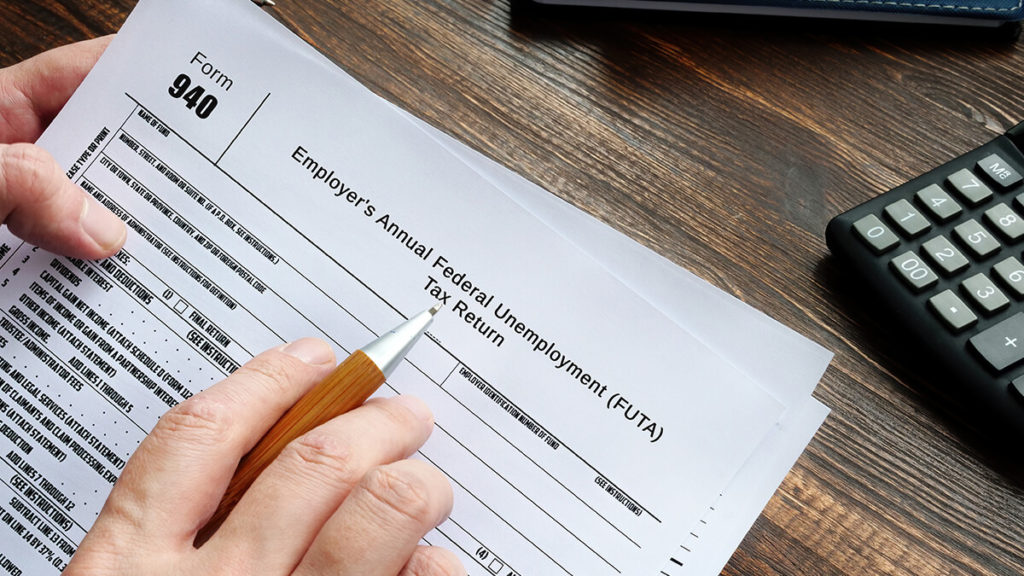Did you employ workers at your small business this year? When you have employees, you need to handle employment taxes, like federal unemployment (FUTA) taxes.
For each employee you have, you must pay a percentage of their wages for federal unemployment taxes, deposit the tax with the IRS, and report your tax liability on Form 940.
So, what is Form 940, which employers have to file it, and how do you file it? Before diving into Form 940, brush up on your FUTA tax liability responsibilities.
About FUTA tax
Most employers are responsible for paying federal unemployment tax. FUTA tax, along with state unemployment taxes, provides unemployment funds for employees who have lost their jobs.
You do not withhold any money from an employee’s wages for FUTA tax. But, you use each employee’s wages to determine how much money you owe.
The standard FUTA tax rate is 6% on the first $7,000 paid to each employee per year. The maximum amount you would pay for each employee per year would be $420 ($7,000 X 0.06).
However, most states receive a tax credit of up to 5.4%, meaning many employers pay only 0.6% on the $7,000 paid to the employee. With the maximum tax credit, the amount you would pay for each employee would be $42 ($7,000 X 0.006).
When you owe FUTA tax, you need to deposit the money and report it.
What is Form 940?
Form 940, Employer’s Annual Federal Unemployment (FUTA) Tax Return, is a form employers file with the IRS to report their yearly FUTA tax liability.
You must file a 940 tax form if either of the following is true:
- You paid wages of at least $1,500 to any employee during the standard calendar year.
- You had an employee (temporary, part-time, or full-time) work anytime during 20 or more weeks. The 20 weeks do not need to be consecutive.
If you normally have employees but didn’t pay employees during a particular calendar year, you still are responsible for filing Form 940 and stating you didn’t make employee payments.
Special FUTA tax and Form 940 rules
Some businesses must follow special rules for FUTA tax liabilities or Form 940 filing requirements. These circumstances are determined by the kind of workers employed. Take a look at these conditions for agricultural employees before filing IRS Form 940.
If you have agricultural employees, you will only file Form 940 if you either paid cash wages of $20,000 or more to farmworkers or employed 10 or more farmworkers during some part of the day for 20 or more weeks.
FUTA tax exemptions
Not all employers are responsible for filing Form 940 and paying FUTA tax. Tax-exempt organizations, government entities, and Indian tribal governments that participated in their state unemployment systems do not need to file Form 940 or pay FUTA tax.
Form 940 instructions
Filling out Form 940 is pretty straightforward.
You must include information about your business, including your Federal Employer Identification Number (FEIN), trade name, and address.
You will also report how much you paid employees, wages excluded from FUTA tax, and your FUTA tax liability.
When to file 940
Form 940 is due by January 31 of each year. If January 31 falls on a weekend or government holiday, it is due the following business day. However, you have until February 12 to file Form 940 if you made your FUTA tax deposits on time.
Where to send Form 940
You can either file Form 940 online or mail it to the IRS. If you e-file it, you must use a third-party and pay a fee. If you’re wondering where to mail Form 940, the address you use depends on your business locality and whether you are including payment. You can find more information on mailing addresses in the IRS’s Instructions for Form 940.
Depositing FUTA tax
Reporting your FUTA tax liability on Form 940 isn’t your only responsibility—you also need to deposit the money with the IRS.
Some small businesses can pay their entire FUTA tax at once. However, many small and larger businesses may need to make quarterly deposits. The quarterly due dates are April 30, July 31, October 31, and January 31.
If your FUTA tax liability is greater than $500 per quarter, you must deposit the money by the quarterly due dates.
If your FUTA tax liability is less than $500 in a quarter, you can roll it over to the next quarter. You will continue rolling it from quarter to quarter if it is less than $500.
If your FUTA tax due is less than $500 for the year, you can submit one annual payment when you file Form 940. You can include payment when you file Form 940 by completing Form 940-V, Payment Voucher.
Do you need an easy way to keep track of your small business payroll? Patriot’s online payroll services let you do your payroll in three simple steps. And when you use our Full Service payroll, we will deposit and file taxes on your behalf. Get your free trial today!
This article has been updated from its original publication date of 1/12/2015.
This is not intended as legal advice; for more information, please click here.
